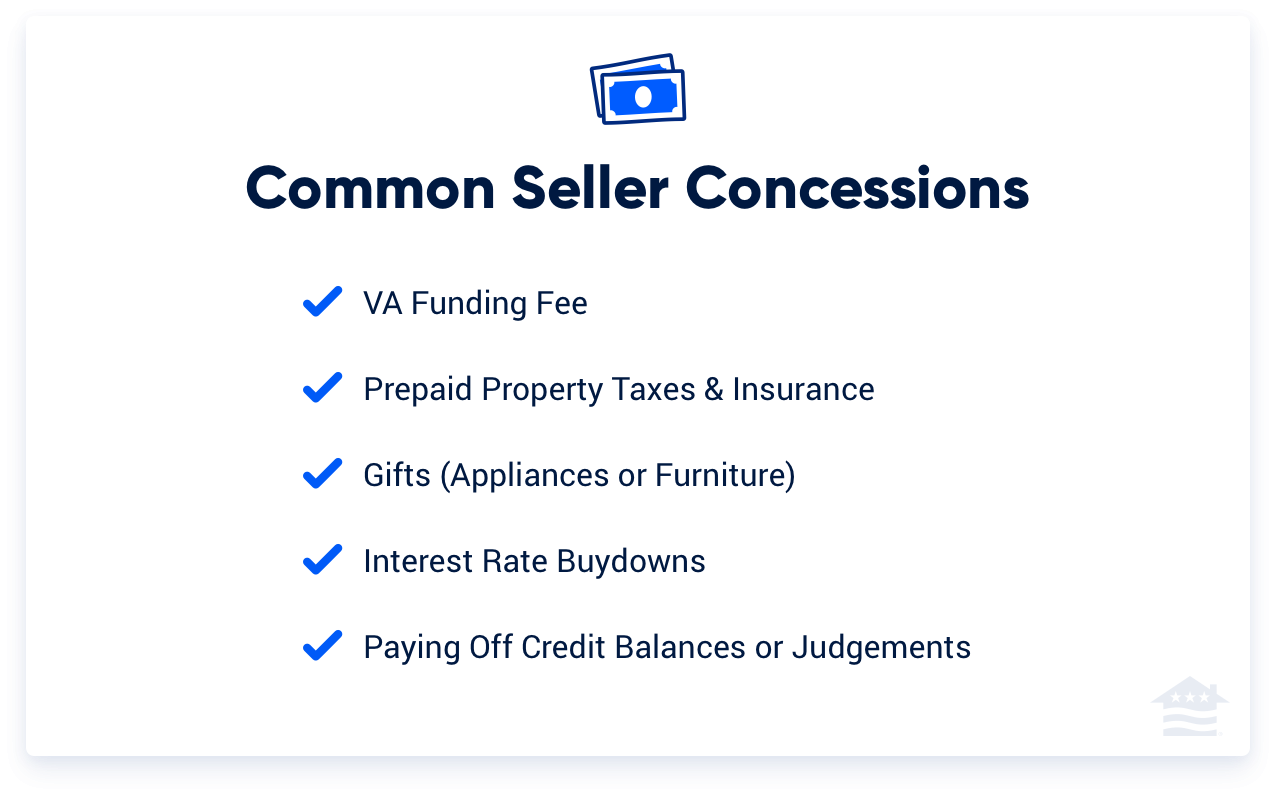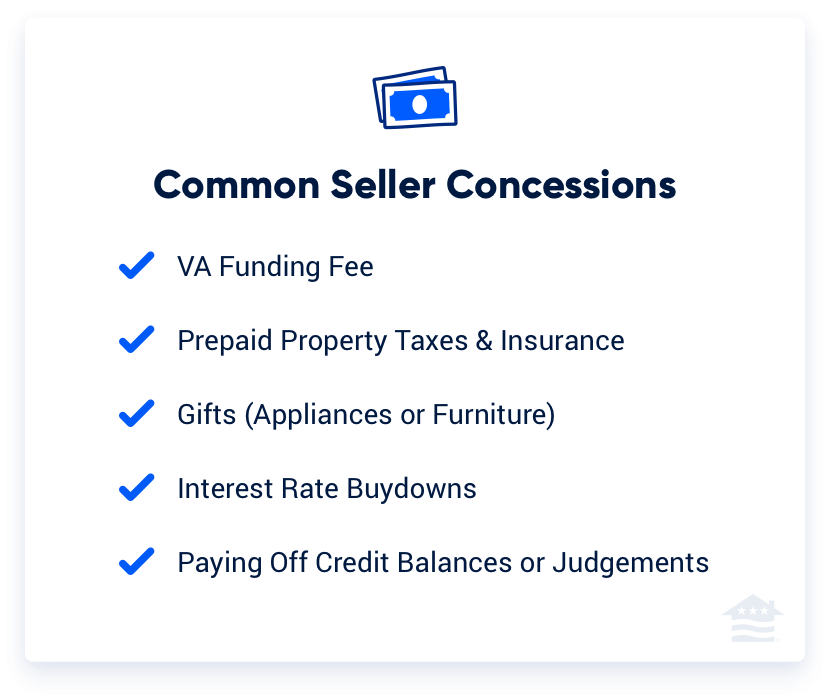- When using a VA loan to buy a home, you may be able to save money by negotiating seller concessions.
- Seller concessions are financial incentives or contributions from the seller that help reduce the buyer's out-of-pocket expenses.
- The Department of Veterans Affairs (VA) limits seller concessions to 4% of the loan amount, but they must be items outside of standard closing costs.
One potential way to save when buying a home is to discuss seller concessions. Seller concessions are financial incentives or contributions that a home seller offers to a homebuyer to help reduce the buyer's out-of-pocket expenses associated with purchasing the home.
The VA’s policy on seller concessions is rather flexible but requires that they do not exceed 4% of the loan amount. The VA also stipulates that the calculation of seller concessions cannot include the buyer's normal closing costs. Instead, seller concessions refer to items outside of standard VA loan closing costs that the seller agrees to pay on behalf of the buyer.


How Do Seller Concessions Work?
Seller concessions are anything of value added to the transaction by the builder or seller that the buyer is not responsible for. These fees can include anything not paid by the buyer or covered by a lender credit. Seller concessions are fees not typically expected or required by the seller to pay.
Seller concessions do not include the payment of the buyer’s closing costs and cannot exceed 4% of the loan amount. Common seller concessions may include:
- Paying the VA Funding Fee: The seller can pay the VA Funding Fee on behalf of the buyer, reducing the buyer's upfront costs.
- Paying off buyer's debts: The seller may pay off certain debts (such as credit cards or auto loans) to assist in qualifying for the loan.
- Permanent interest rate buydowns: The seller pays discount points to lower the interest rate for the life of the loan.
- Temporary interest rate buydowns: Funds are placed in escrow to reduce the interest rate temporarily (e.g., a 2-1 buydown).
- Prepayment of taxes and insurance: The seller can prepay property taxes and homeowners insurance premiums for the buyer.
- Homeowners' association (HOA) fees: The seller can pay a portion of the buyer's HOA initiation fees or dues.
- Closing gifts: Sellers may provide gifts, typically items like appliances, furniture or new flooring.
Closing Costs and Seller Concessions
With a VA loan, distinguishing closing costs from seller concessions is essential. Closing costs are standard fees associated with obtaining a mortgage and completing a real estate transaction.
The seller can agree to pay all of the buyer's loan-related closing costs without those counting toward the VA's 4% seller concession limit.
Typical closing costs include:
- Origination fee: This fee covers the lender's cost to underwrite and process your loan application.
- VA appraisal fee: A mandatory VA appraisal assesses the home's value and ensures it meets the VA's Minimum Property Requirements.
- Title insurance: This required fee protects the lender against potential disputes over property ownership.
- Property taxes: These are pro-rated taxes due at closing; the seller can prepay these fees for a specified period.
- Attorney fees: Some states require an attorney to conduct the closing, which incurs additional fees.
Understanding the Difference
Closing Costs: These are standard fees the buyer can pay or negotiate for the seller to pay. There is no limit on how much the seller can contribute toward these costs with a VA loan.
Seller Concessions: These are additional contributions from the seller beyond traditional closing costs.
Explaining the 4% VA Seller Concession Rule
VA rules say that the value of a seller concession can equal as much as 4% of the selling price. Again, that's in addition to typical loan-related closing costs.
For comparison, conventional loans typically allow sellers to pay 3% in concessions, while FHA borrowers can ask sellers to pay up to 6%.
Sellers are not required to offer concessions or pay any of a VA buyer's closing costs. This is always a matter of negotiation between the two parties, so having a VA-savvy real estate agent can make a huge difference. Some sellers are more likely than others to pay concessions to sell their home.
How Seller Concessions Help Homebuyers
To fully understand the importance of seller concessions, let’s walk through an example. Say you buy a home for $400,000 in today’s market. While some homes move quickly, others may stay on the market for a while. Those sellers may be more willing to make deals to get to the closing table.
In this case, the home has sat on the market for 20 days, and the seller agrees to:
- Cover all your standing closing costs
- Contribute an additional $8,000 toward paying off your auto loan
That $8,000 counts as a seller concession because it exceeds the typical closing costs. Eliminating the car loan frees up about $200 per month in your budget, making it easier to qualify for the VA loan and manage your monthly expenses.
When the property closes, the official record will say it sold for $400,000. However, you walked away with 0% down, no out-of-pocket closing costs and an extra $8,000 debt paid off at settlement.
Even in a competitive housing market, seller concessions can offer significant financial relief and provide greater flexibility in the homeownership process. Connect with a Veterans United VA loan expert to learn more about VA seller concession policies.
How We Maintain Content Accuracy
Our mortgage experts continuously track industry trends, regulatory changes, and market conditions to keep our information accurate and relevant. We update our articles whenever new insights or updates become available to help you make informed homebuying and selling decisions.
Current Version
Oct 23, 2025
Written ByChris Birk
Reviewed ByTara Dometrorch
Updated article for readability and incorporated more examples. Content reviewed and fact checked by team lead underwriter Tara Dometrorch.
Related Posts
-
 How Discount Mortgage Points Work on a VA LoanPurchasing discount points on a VA loan can be a good investment for Veterans looking to lower their interest rate.
How Discount Mortgage Points Work on a VA LoanPurchasing discount points on a VA loan can be a good investment for Veterans looking to lower their interest rate. -
 Understanding Government-Backed MortgagesGovernment-backed mortgages, like FHA, VA, and USDA loans, offer more secure and accessible homeownership options with low down payments and flexible credit requirements.
Understanding Government-Backed MortgagesGovernment-backed mortgages, like FHA, VA, and USDA loans, offer more secure and accessible homeownership options with low down payments and flexible credit requirements.

